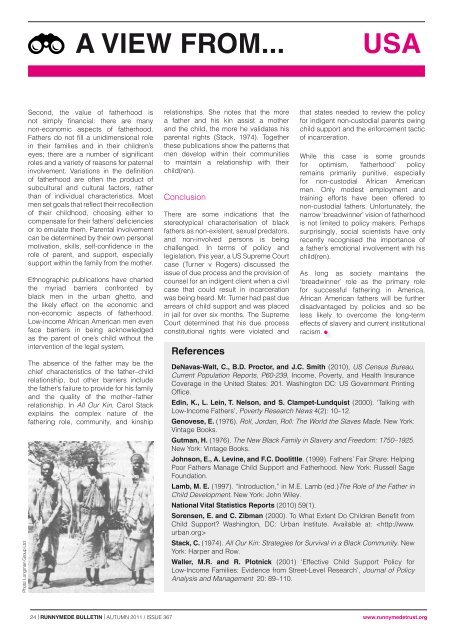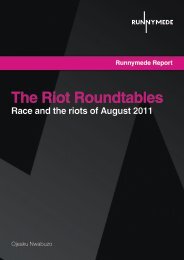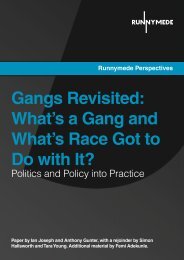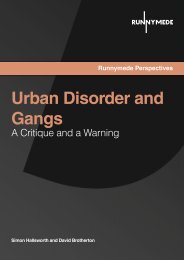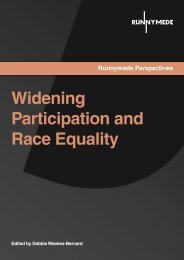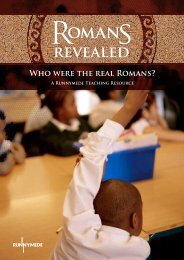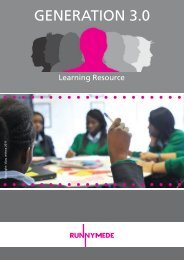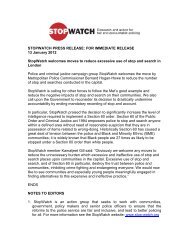PARENTINg - Runnymede Trust
PARENTINg - Runnymede Trust
PARENTINg - Runnymede Trust
Create successful ePaper yourself
Turn your PDF publications into a flip-book with our unique Google optimized e-Paper software.
A VIEW FROM...<br />
USA<br />
Photo: Longman Group Ltd.<br />
Second, the value of fatherhood is<br />
not simply financial: there are many<br />
non-economic aspects of fatherhood.<br />
Fathers do not fill a unidimensional role<br />
in their families and in their children’s<br />
eyes; there are a number of significant<br />
roles and a variety of reasons for paternal<br />
involvement. Variations in the definition<br />
of fatherhood are often the product of<br />
subcultural and cultural factors, rather<br />
than of individual characteristics. Most<br />
men set goals that reflect their recollection<br />
of their childhood, choosing either to<br />
compensate for their fathers’ deficiencies<br />
or to emulate them. Parental involvement<br />
can be determined by their own personal<br />
motivation, skills, self-confidence in the<br />
role of parent, and support, especially<br />
support within the family from the mother.<br />
Ethnographic publications have charted<br />
the myriad barriers confronted by<br />
black men in the urban ghetto, and<br />
the likely effect on the economic and<br />
non-economic aspects of fatherhood.<br />
Low-income African American men even<br />
face barriers in being acknowledged<br />
as the parent of one’s child without the<br />
intervention of the legal system.<br />
The absence of the father may be the<br />
chief characteristics of the father–child<br />
relationship, but other barriers include<br />
the father’s failure to provide for his family<br />
and the quality of the mother–father<br />
relationship. In All Our Kin, Carol Stack<br />
explains the complex nature of the<br />
fathering role, community, and kinship<br />
relationships. She notes that the more<br />
a father and his kin assist a mother<br />
and the child, the more he validates his<br />
parental rights (Stack, 1974). Together<br />
these publications show the patterns that<br />
men develop within their communities<br />
to maintain a relationship with their<br />
child(ren).<br />
Conclusion<br />
There are some indications that the<br />
stereotypical characterisation of black<br />
fathers as non-existent, sexual predators,<br />
and non-involved persons is being<br />
challenged. In terms of policy and<br />
legislation, this year, a US Supreme Court<br />
case (Turner v Rogers) discussed the<br />
issue of due process and the provision of<br />
counsel for an indigent client when a civil<br />
case that could result in incarceration<br />
was being heard. Mr. Turner had past due<br />
arrears of child support and was placed<br />
in jail for over six months. The Supreme<br />
Court determined that his due process<br />
constitutional rights were violated and<br />
References<br />
that states needed to review the policy<br />
for indigent non-custodial parents owing<br />
child support and the enforcement tactic<br />
of incarceration.<br />
While this case is some grounds<br />
for optimism, ‘fatherhood’ policy<br />
remains primarily punitive, especially<br />
for non-custodial African American<br />
men. Only modest employment and<br />
training efforts have been offered to<br />
non-custodial fathers. Unfortunately, the<br />
narrow ‘breadwinner’ vision of fatherhood<br />
is not limited to policy makers. Perhaps<br />
surprisingly, social scientists have only<br />
recently recognised the importance of<br />
a father’s emotional involvement with his<br />
child(ren).<br />
As long as society maintains the<br />
‘breadwinner’ role as the primary role<br />
for successful fathering in America,<br />
African American fathers will be further<br />
disadvantaged by policies and so be<br />
less likely to overcome the long-term<br />
effects of slavery and current institutional<br />
racism.<br />
DeNavas-Walt, C., B.D. Proctor, and J.C. Smith (2010), US Census Bureau,<br />
Current Population Reports, P60-239, Income, Poverty, and Health Insurance<br />
Coverage in the United States: 201. Washington DC: US Government Printing<br />
Office.<br />
Edin, K., L. Lein, T. Nelson, and S. Clampet-Lundquist (2000). ‘Talking with<br />
Low-Income Fathers’, Poverty Research News 4(2): 10–12.<br />
Genovese, E. (1976). Roll, Jordan, Roll: The World the Slaves Made. New York:<br />
Vintage Books.<br />
Gutman, H. (1976). The New Black Family in Slavery and Freedom: 1750–1925.<br />
New York: Vintage Books.<br />
Johnson, E., A. Levine, and F.C. Doolittle. (1999). Fathers’ Fair Share: Helping<br />
Poor Fathers Manage Child Support and Fatherhood. New York: Russell Sage<br />
Foundation.<br />
Lamb, M. E. (1997). “Introduction,” in M.E. Lamb (ed.)The Role of the Father in<br />
Child Development. New York: John Wiley.<br />
National Vital Statistics Reports (2010) 59(1).<br />
Sorensen, E. and C. Zibman (2000). To What Extent Do Children Benefit from<br />
Child Support? Washington, DC: Urban Institute. Available at: <br />
Stack, C. (1974). All Our Kin: Strategies for Survival in a Black Community. New<br />
York: Harper and Row.<br />
Waller, M.R. and R. Plotnick (2001) ‘Effective Child Support Policy for<br />
Low-Income Families: Evidence from Street-Level Research’, Journal of Policy<br />
Analysis and Management 20: 89–110.<br />
24 | RUNNYMEDE BULLETIN | Autumn 2011 / issue 367 www.runnymedetrust.org


